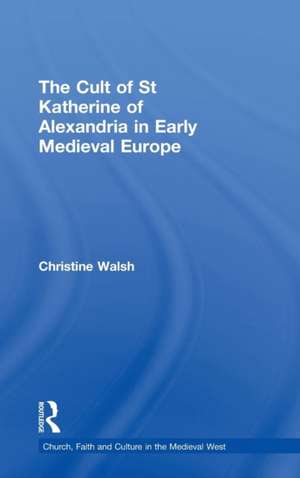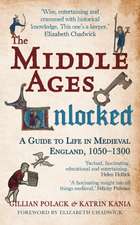The Cult of St Katherine of Alexandria in Early Medieval Europe: Church, Faith and Culture in the Medieval West
Autor Christine Walshen Limba Engleză Hardback – 28 aug 2007
Din seria Church, Faith and Culture in the Medieval West
- 9%
 Preț: 936.25 lei
Preț: 936.25 lei -
 Preț: 529.38 lei
Preț: 529.38 lei -
 Preț: 341.55 lei
Preț: 341.55 lei -
 Preț: 489.26 lei
Preț: 489.26 lei - 17%
 Preț: 259.98 lei
Preț: 259.98 lei - 18%
 Preț: 1054.71 lei
Preț: 1054.71 lei -
 Preț: 390.46 lei
Preț: 390.46 lei -
 Preț: 469.34 lei
Preț: 469.34 lei - 18%
 Preț: 1054.71 lei
Preț: 1054.71 lei - 18%
 Preț: 1059.45 lei
Preț: 1059.45 lei -
 Preț: 398.18 lei
Preț: 398.18 lei -
 Preț: 389.38 lei
Preț: 389.38 lei - 26%
 Preț: 764.20 lei
Preț: 764.20 lei - 18%
 Preț: 1071.27 lei
Preț: 1071.27 lei - 18%
 Preț: 1072.88 lei
Preț: 1072.88 lei - 18%
 Preț: 1062.62 lei
Preț: 1062.62 lei - 26%
 Preț: 765.43 lei
Preț: 765.43 lei - 18%
 Preț: 1054.71 lei
Preț: 1054.71 lei - 18%
 Preț: 1054.71 lei
Preț: 1054.71 lei - 25%
 Preț: 826.01 lei
Preț: 826.01 lei - 26%
 Preț: 848.96 lei
Preț: 848.96 lei - 18%
 Preț: 1068.15 lei
Preț: 1068.15 lei -
 Preț: 469.34 lei
Preț: 469.34 lei - 25%
 Preț: 770.26 lei
Preț: 770.26 lei -
 Preț: 389.66 lei
Preț: 389.66 lei - 18%
 Preț: 1054.71 lei
Preț: 1054.71 lei - 28%
 Preț: 823.99 lei
Preț: 823.99 lei - 17%
 Preț: 259.98 lei
Preț: 259.98 lei - 18%
 Preț: 1000.27 lei
Preț: 1000.27 lei - 18%
 Preț: 1065.78 lei
Preț: 1065.78 lei -
 Preț: 489.26 lei
Preț: 489.26 lei - 18%
 Preț: 1000.27 lei
Preț: 1000.27 lei - 18%
 Preț: 1054.71 lei
Preț: 1054.71 lei - 18%
 Preț: 1000.27 lei
Preț: 1000.27 lei - 18%
 Preț: 1109.18 lei
Preț: 1109.18 lei - 18%
 Preț: 1057.09 lei
Preț: 1057.09 lei - 18%
 Preț: 1007.36 lei
Preț: 1007.36 lei - 16%
 Preț: 251.54 lei
Preț: 251.54 lei - 18%
 Preț: 1119.52 lei
Preț: 1119.52 lei
Preț: 1111.51 lei
Preț vechi: 1355.50 lei
-18% Nou
Puncte Express: 1667
Preț estimativ în valută:
212.69€ • 221.63$ • 176.10£
212.69€ • 221.63$ • 176.10£
Carte tipărită la comandă
Livrare economică 03-17 aprilie
Preluare comenzi: 021 569.72.76
Specificații
ISBN-13: 9780754658610
ISBN-10: 0754658619
Pagini: 244
Dimensiuni: 156 x 234 x 16 mm
Greutate: 0.52 kg
Ediția:1
Editura: Taylor & Francis
Colecția Routledge
Seria Church, Faith and Culture in the Medieval West
Locul publicării:Oxford, United Kingdom
ISBN-10: 0754658619
Pagini: 244
Dimensiuni: 156 x 234 x 16 mm
Greutate: 0.52 kg
Ediția:1
Editura: Taylor & Francis
Colecția Routledge
Seria Church, Faith and Culture in the Medieval West
Locul publicării:Oxford, United Kingdom
Cuprins
Contents: Preface; Introduction; The historical Katherine; Byzantium; Sinai; Italy; The cult of St Katherine in Normandy; The introduction of the cult of St Katherine into England; Conclusion; Appendices:A: The early manuscript tradition of the passio of St Katherine; B: Translation of 3 odes to St Katherine by Alfanus, bishop of Salerno (1058-1085); C: The miracles of St Katherine: a translation of BM, Rouen, MS. U.22, fols 112r-115v; D: Analysis of 4 Winchester calendars; E: Extract from the Canterbury Missal, Corpus Christi College Cambridge 270, fols 134r-135r; Bibliography; Index.
Recenzii
’A study providing more information than Walsh's about Saint Katherine's early following is difficult for this reviewer to imagine. ... The care with which she treats both the sources and the previous scholarship gives to the whole study an admirable precision. ... There is, then, much to recommend this book, which also includes a substantial appendix containing critical discussion and translations of odes, miracle stories, and liturgical texts pertaining to Katherine. It is clear that the study is primarily addressed to historians; and the historical kernels it finds are hard won. However, the author's attentiveness to the rhetorical strategies marking the sources, along with the substantial textual material appended to the study, will also make the book of interest to literary critics and hagiographic researchers, especially those investigating the depictions of female martyrs and saints. Finally--and perhaps most important of all--the book offers a fine example of the way scholarship intensely focused on very particular matters can bring to light broader social and cultural practices that characterize the interconnectedness of medieval religion and society.’ The Medieval Review ’...this is a treasure trove of information on Katherine’s early cult and thus an important contribution to our knowledge of the saint.’ Early Medieval Europe
Descriere
St Katherine of Alexandria was one of the most popular saints in both the Orthodox and Latin Churches in the later Middle Ages, yet there has been little study into the way in which her cult developed before c. 1200. This new book redresses the balance, providing a thorough examination of the way the cult spread from the Greek-speaking lands of the Eastern Mediterranean and into Western Europe.









